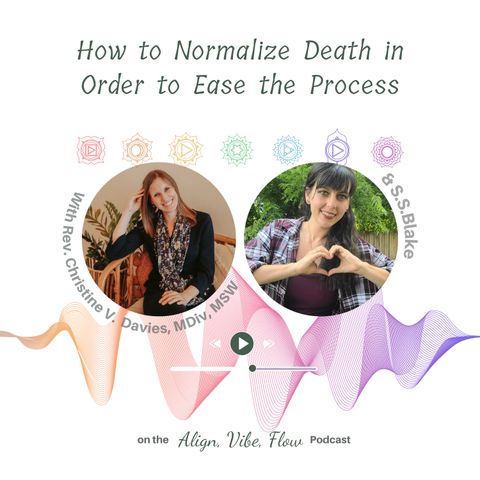How to Normalize Death in Order to Ease the Process
14 de may. de 2024 ·
58m 30s

Descarga y escucha en cualquier lugar
Descarga tus episodios favoritos y disfrútalos, ¡dondequiera que estés! Regístrate o inicia sesión ahora para acceder a la escucha sin conexión.
Descripción
Duncan Trussell has a podcast where he brought on his mother as a guest 2 weeks before she died (also made into a Midnight Gospel episode). They knew she was...
mostra más
Duncan Trussell has a podcast where he brought on his mother as a guest 2 weeks before she died (also made into a Midnight Gospel episode). They knew she was dying and spoke on the acceptance of death in this episode, made even more powerful by the fact that she did pass so quickly after it’s recording.Alan Watts spoke about how you can be on your death bed and your well meaning friends and family will come into the room insisting that you’ll be better soon which isn’t helpful. A well versed preacher however can come in and make you feel good about dying.Our society and culture spends a lot of time avoiding the fact of death which makes it harder on each and every one of us when we are inevitably forced to face it. It’s something that we all have to interact with sooner or later and next to none of us are prepared for it or know what to do and how to handle it because it’s such an avoided subject.Toxic positivity is a problem here. We want to cheer people up and we’ll use all sorts of words to try and do so but it often ends up doing more harm than good. Some things in life are dark and not at all cheery. Trying to pretend they are isn’t helpful but just because they are on the darker side of things doesn’t mean that we have to avoid them. They’re uncomfortable, but they are normal.Toxic spirituality is a thing, where people put their own ideologies on others in an effort to calm the pain, lend some advice or provide comfort. Unfortunately, this well meaning tactic can cause the person who’s already experiencing pain to now feel uncomfortable if their own beliefs don’t align with the ones being called upon and shared.These methods silence the person who is struggling. Not intentionally, but the discomfort they feel leads them to silence rather than the comfort of being allowed the space and freedom to process the way they need to process in order to find acceptance and move forward. When provided with the space and freedom needed for these emotions, our person in question may be able to find within themselves the words or actions needed to connect with their loved ones in a safe and meaningful way that helps everyone survive this intense moment in a constructive way.Being able to ‘bear witness’ to their pain and suffering allows them the opportunity and ability to have what we call a ‘good death’. Where they’re able to speak their truth, be heard and focus on what’s truly important.We accomplish these desired results by saying and doing less which is counter intuitive. We feel, think and want to do something to lessen the pain and suffering of our fellow humans but where death and severe sickness or injury are of subject, there is nothing we can do or say to make anything better. The best that we can do is to simply be present and allow those suffering to lead the show in what they need.To support someone in pain and suffering:
mostra menos
Información
| Autor | Savannah Blake |
| Organización | Savannah Blake |
| Página web | - |
| Etiquetas |
Copyright 2024 - Spreaker Inc. an iHeartMedia Company
